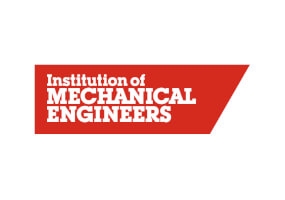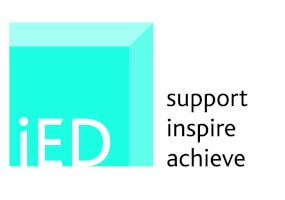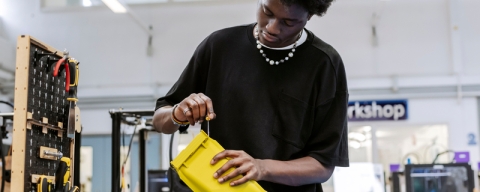
Key information
UCAS code:
H771
Accreditation:
This course is Accredited
Typical offer:
112-120 UCAS points from 2 or 3 A levels
Showing content for section Overview
Overview
Unleash your creativity and bring your ideas to life.
On this BSc (Hons) Product Design and Innovation degree course, you'll combine the theories and methodologies of art and engineering to create and improve the products we use in efficient and cost-effective ways.
You'll develop your understanding of engineering design, illustration and computer-aided design while also exploring how to create successful and sustainable products in a competitive market. By graduation, you'll be set up for a career creating and designing products.
Course highlights
- Use sophisticated computer software and rapid prototyping equipment to design new products and improve existing ones
- Learn the fundamentals of illustration, computer-aided illustration, computer-aided design (CAD) and manufacturing technology
- Learn how to use professional software to visually communicate your product ideas, including Photoshop, InDesign, AutoCad (for 2D technical drawing), Creo (for 3D CAD modeling, manufacturing simulations and virtual prototyping) and Keyshot (for photorealistic rendering and animation).
- Work on briefs run in collaboration with industry experts/partners given to you by a design professional – previous students have conceptualised a handheld yacht controller for Raymarine
Engineering Project Day 2022 - Generating sustainable energy
Jake, a BSc Product Design student, talks us through his final year project - "Using the public's everyday movements to generate sustainable energy"
I've done a project on generating energy, using people's movement.
As the population is growing, obviously we are using more energy.
By having a product like this, we reduce the amount of energy needed for these applications outsourced by fossil fuels.
We're really trying to create a more greener future.
I'm really proud. It's taken me a long time. I've really enjoyed the course and how it's led to this final sort of moment.
My favourite thing about product design has been the sort of community element of it and 3D printing.
I really love the CAD and software that we get access to.
I've really enjoyed it.
I love all the coursework we get given especially when CAD software is involved. Learning a new skill or completing a tough piece of work on CAD is so rewarding. I am most proud of how my skills are developing including; CAD skills, drawing skills, group work communication, presentation skills and so many more.
Accreditation
This course is accredited by the Institution of Mechanical Engineers (IMechE) and The Institution of Engineering Designers (IED) fulfilling the requirements for membership and meeting in full the academic requirement for IEng (Incorporated Engineer).
Contact information
Contact AdmissionsEntry requirements
BSc (Hons) Product Design and Innovation degree entry requirements
Typical offers
- UCAS points - 112-120 points from 2 or 3 A levels, or equivalent, to include a relevant subject. (calculate your UCAS points)
- A levels - BBB-BBC, to include a relevant subject.
Relevant subjects: Mathematics; Further Mathematics; Statistics; Computer Science; Software Systems Development; Electronics; Physics; Information Technology (IT); Economics. - T-levels - Merit
Acceptable T Level Subjects: T Level in Digital: Digital Production, Design and Development, T Level in Construction: Design, Surveying and Planning, T Level in Building Services Engineering, T Level in Engineering and Manufacturing Design and Development, T Level in Maintenance, Installation and Repair for Engineering and Manufacturing, T Level in Engineering, Manufacturing, Processing and Control, T Level in Accounting (if mathematical components are passed), T Level in Finance (if mathematical components are passed) - BTECs (Extended Diplomas) - DDM-DMM
- International Baccalaureate - 29
You may need to have studied specific subjects – see full entry requirements.
English language requirements
- English language proficiency at a minimum of IELTS band 6.0 with no component score below 5.5.
See alternative English language qualifications
We also accept other standard English tests and qualifications, as long as they meet the minimum requirements of your course.
If you don't meet the English language requirements yet, you can achieve the level you need by successfully completing a pre-sessional English programme before you start your course.
We look at more than just your grades
While we consider your grades when making an offer, we also carefully look at your circumstances and other factors to assess your potential. These include whether you live and work in the region and your personal and family circumstances which we assess using established data.
If you don't meet the entry requirements, you may be able to join this course after you successfully complete a foundation year.
Facilities and specialist equipment
Product Design BSc (Hons) - University of Portsmouth
Learn about the facilities on offer at the University of Portsmouth on our BSc (Hons) Product Design and Innovation course.
The Product Design and Innovation course is a subtle blend of design skills and engineering skills, material science, bringing the creativity to engineering. This allows you to bring the knowledge you've got from a science and engineering background, but apply it to designing and creating new things. I think for product design, the appeal for our students is whatever you feel like your strengths are, you can kind of lean into that a little bit.
So if you prefer the CAD design and the modelling in there, you can enhance your skills in that. If you like the material science, you can look at that. If you like the creativity and the design side of things, you can focus on your conceptual design work. Particularly for our graduates as well, there's such a diverse range of jobs, whether you want to go on to be a pure product designer, maybe as a consultant you can, if you want to go on to do more engineering, if you want to go into management, innovation. There's so many options available to you and I think that's what our students really get out of our course. This is the product design studio. This is an open access space where students can come in whenever they feel like it. We've got lots of facilities for them, lots of equipment they can use to work on their projects, their designs and their module coursework. We have Octocore computers with really good processing power,
we've got graphics tablets of all kinds, we've got dedicated Wacom Cintiqs that you can draw straight onto the screen, we've got 3Dconnexion Spacemouse kits, the wireless ones, so students can do advanced CAD modelling with those. We primarily use Creo and KeyShot for our course and we've got access to all the software students could possibly need.
So between the second and third years, students can opt to do a placement year. This is something we strongly encourage because employers really favour students who have a year of industry experience. You’ll be working in a course-relevant environment or project. Placement students always come back much stronger, they've got a bunch of industry skills that they can bring back with them,
it really bolsters what they can deliver in the final year and their final year projects always come out that much stronger. I'm really proud to be part of this course and deliver to our students something that they can really get stuck into and it's so good to see what our students go on to do after they graduate. So many of them have got really interesting, exciting careers and it's just fantastic to be part of that development.
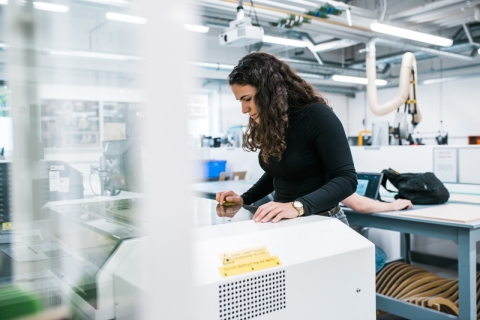
Manufacturing equipment
Use our computer aided design (CAD) and rapid prototyping suite, including various 3D printing systems for the creation of models for aesthetic, ergonomic and functional testing, including the assembly and integration of working prototypes.
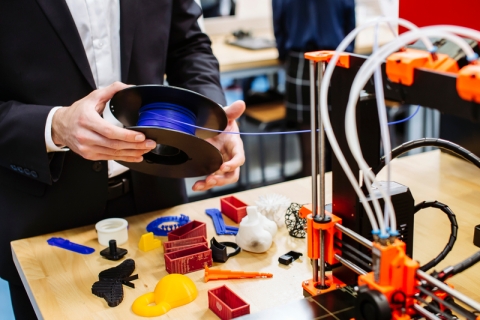
3D printing workshops
Test concepts, build prototypes and bring your designs to life in our 3D printing workshop. Apply large and small scale 3D printing and finishing processes, using industry-standard equipment, with specialist technical support available throughout.
Student Workshop and Advanced Manufacturing Lab
With equipment including a laser cutter, moulding tools, drills and saws, the Student Workshop is equipped to help you complete basic fabrication tasks. Machinery in the Advanced Manufacturing Lab includes a Computer Numerical Control (CNC) lathe and CNC mill and can be used by technicians to realise your designs through techniques such as thread cutting, helical milling and wire erosion.
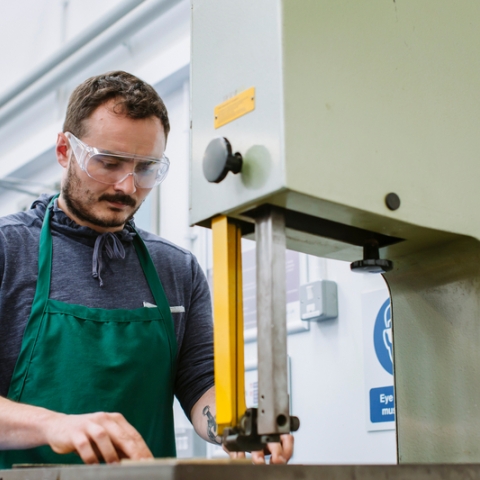
Product design studios
Explore our product design studios, and see how to get your hands on design equipment from clay to touch-screen computer aided design.
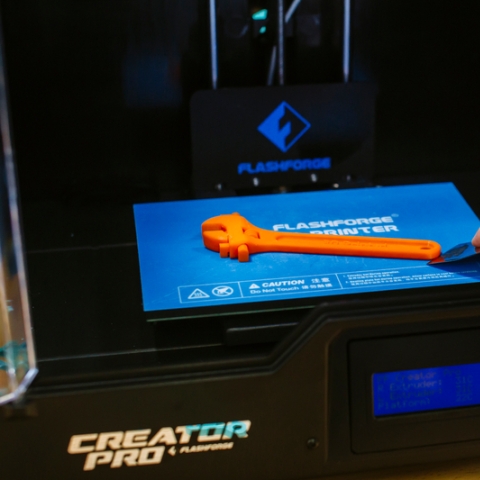
Metrology Laboratory
Put the science of measurement into practice with manual metrology equipment and a suite of Mitutoyo measuring machines including coordinate measuring machines, a contour and surface roughness measuring machine and 3D laser scanners.
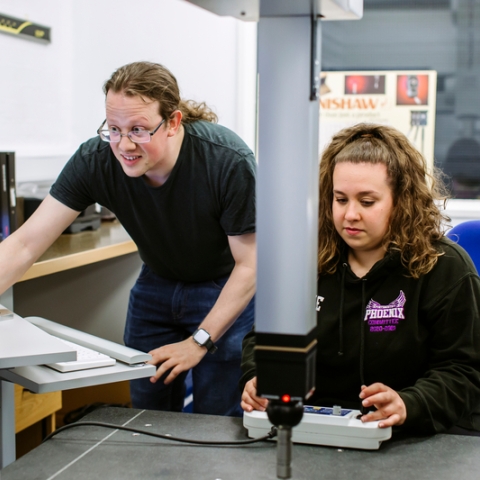
Careers and opportunities
The skills you learn on this course will prepare you to work in any industry you're passionate about, in areas such as product design, design management, consultancy, engineering, marketing and graphic design.
Depending on the roles you go into and your experience in industry, you could earn up to £35,000 as a CAD technician, up to £45,000 as a product designer, or up to £35,000 as an exhibition designer. These average salaries all have the potential to increase in line with your experience and position in a company.
Graduate destinations
Our graduates have worked for companies such as:
- SharkNinja
- Celli UK
- ETL
- Ava Energy
- CenTrak
What jobs can you do with a product design and innovation degree?
Our graduates now work in roles including:
- project manager (transformation team)
- customer success strategizer
- design technology teacher
- account executive
- junior product designer
Other graduates have continued their studies at postgraduate level or set up successful businesses with help and support from the University.
Ongoing career support – up to 5 years after you graduate
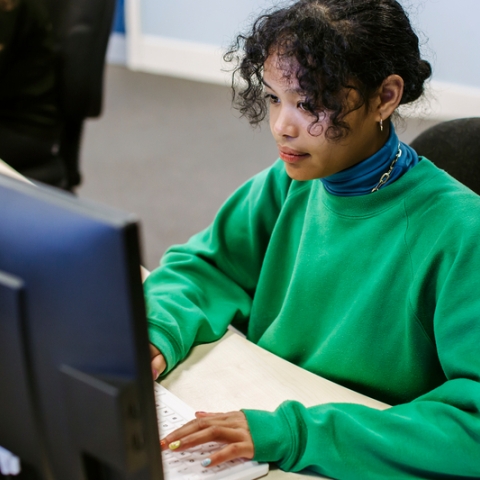
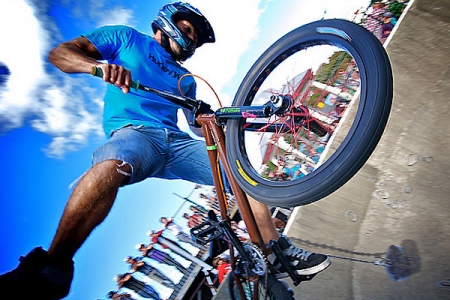
Glen's degree transformed his life and career after brain injury
"I set my own business up while I was at the University. I created my own design company and started to build something called a StepXCycle. It’s a 3D printed, transportable, electric step bike made from new material sciences. The Student Enterprise Team helped me with setting up the business, and I won an award from the IMechE for the project."
Placement year (optional)
Taking an optional placement year will give you the experience you need to increase your chances of landing your perfect role after graduation.
We'll give you all the support you need to find a placement that prepares you for your career, and we'll continue to mentor you throughout your placement.
You could also choose to set up your own business, or take a voluntary placement.
Potential roles
Previous students have taken placement roles such as:
- junior design and development engineer
- undergraduate mechatronics engineer
- CAD design Intern
- engineering placement student
- mechanical systems and design engineer
Potential destinations
They've completed placements at organisations including:
- Nissan
- Morgan Furniture
- Cummins
- Hi-Technology Group
- Prysmian Cables and Systems
Modules
Each module on this course is worth a certain number of credits.
In each year, you need to study modules worth a total of 120 credits. For example, four modules worth 20 credits and one module worth 40 credits.
What you'll study
Core modules
Core modules
In this module, you'll analyse needs, develop a product design specification, then explore and evaluate concepts and options. You'll then consider the design brief's performance, time-scale, and feasibility goals, and select an appropriate design concept to meet them.
Optional modules
Core modules
After your second or third year, you can do an optional study abroad or work placement year to get valuable longer-term work experience in the industry.
We’ll help you secure a work placement that fits your aspirations. You’ll get mentoring and support throughout the year.
Changes to course content
We use the best and most current research and professional practice alongside feedback from our students to make sure course content is relevant to your future career or further studies.
Therefore, some course content may change over time to reflect changes in the discipline or industry. If a module doesn't run, we'll let you know as soon as possible and help you choose an alternative module.
I like the way our course allows students to have their own independence.
Teaching
Teaching methods on this course include:
- lectures
- seminars
- tutorials (personal and academic)
- laboratory work
- project work
- computer-aided design (CAD) system activity
- open access study
How you're assessed
You’ll be assessed through:
- written examinations and multiple choice tests
- coursework and portfolio
- case studies
- practical tests
- presentations
You’ll be able to test your skills and knowledge informally before you do assessments that count towards your final mark.
You can get feedback on all practice and formal assessments so you can improve in the future.
How you'll spend your time
One of the main differences between school or college and university is how much control you have over your learning.
We use a blended learning approach to teaching, which means you’ll take part in both face-to-face and online activities during your studies. As well as attending your timetabled classes you'll study independently in your free time, supported by staff and our virtual learning environment, Moodle.
A typical week
We recommend you spend at least 35 hours a week studying for your BSc (Hons) Product Design and Innovation degree. In your first year, you’ll be in timetabled teaching activities such as lectures, tutorials, practical classes and supervised workshop time for about 12 hours a week. The rest of the time you’ll do independent study such as research, reading, coursework and project work, alone or in a group with others from your course. You'll probably do more independent study and have less scheduled teaching in years 2 and 3, but this depends on which modules you choose.
Most timetabled teaching takes place during the day, Monday to Friday. Optional field trips may involve evening and weekend teaching or events. There’s usually no teaching on Wednesday afternoons.
Term dates
The academic year runs from September to June. There are breaks at Christmas and Easter.
Supporting you
The amount of timetabled teaching you'll get on your degree might be less than what you're used to at school or college, but you'll also get support via video, phone and face-to-face from teaching and support staff to enhance your learning experience and help you succeed. You can build your personalised network of support from the following people and services:
Types of support
Your personal tutor helps you make the transition to independent study and gives you academic and personal support throughout your time at university.
As well as regular scheduled meetings with your personal tutor, they're also available at set times during the week if you want to chat with them about anything that can't wait until your next meeting.
You'll have help from a team of faculty learning support tutors. They can help you improve and develop your academic skills and support you in any area of your study in one-on-one and group sessions.
They can help you:
- master the mathematics skills you need to excel on your course
- understand engineering principles and how to apply them in any engineering discipline
- solve computing problems relevant to your course
- develop your knowledge of computer programming concepts and methods relevant to your course
- understand and use assignment feedback
All our labs and practical spaces are staffed by qualified laboratory support staff. They’ll support you in scheduled lab sessions and can give you one-to-one help when you do practical research projects.
As well as support from faculty staff and your personal tutor, you can use the University's Academic Skills Unit (ASK).
ASK provides one-to-one support in areas such as:
- Academic writing
- Note taking
- Time management
- Critical thinking
- Presentation skills
- Referencing
- Working in groups
- Revision, memory and exam techniques
If you have a disability or need extra support, the Additional Support and Disability Centre (ASDAC) will give you help, support and advice.
Our online Learning Well mini-course will help you plan for managing the challenges of learning and student life, so you can fulfil your potential and have a great student experience.
You can get personal, emotional and mental health support from our Student Wellbeing Service, in person and online. This includes 1–2–1 support as well as courses and workshops that help you better manage stress, anxiety or depression.
If you require extra support because of a disability or additional learning need our specialist team can help you.
They'll help you to
- discuss and agree on reasonable adjustments
- liaise with other University services and facilities, such as the library
- access specialist study skills and strategies tutors, and assistive technology tutors, on a 1-to-1 basis or in groups
- liaise with external services
Library staff are available in person or by email, phone, or online chat to help you make the most of the University’s library resources. You can also request one-to-one appointments and get support from a librarian who specialises in your subject area.
The library is open 24 hours a day, every day, in term time.
The Maths Cafe offers advice and assistance with mathematical skills in a friendly, informal environment. You can come to our daily drop-in sessions, develop your mathematics skills at a workshop or use our online resources.
If English isn't your first language, you can do one of our English language courses to improve your written and spoken English language skills before starting your degree. Once you're here, you can take part in our free In-Sessional English (ISE) programme to improve your English further.
Costs and funding
Tuition fees
- UK/Channel Islands and Isle of Man students – £9,250 per year (may be subject to annual increase)
- EU students – £9,250 a year (including Transition Scholarship - may be subject to annual increase)
- International (non-EU) students – £19,200 per year (subject to annual increase)
Funding your studies
Find out how to fund your studies, including the scholarships and bursaries you could get. You can also find more about tuition fees and living costs, including what your tuition fees cover.
Applying from outside the UK? Find out about funding options for international students.
Additional course costs
These course-related costs aren’t included in the tuition fees. So you’ll need to budget for them when you plan your spending.
Additional costs
Our accommodation section show your accommodation options and highlight how much it costs to live in Portsmouth.
You’ll study up to 6 modules a year. You may have to read several recommended books or textbooks for each module.
You can borrow most of these from the Library. If you buy these, they may cost up to £60 each.
We recommend that you budget £75 a year for photocopying, memory sticks, DVDs and CDs, printing charges, binding and specialist printing.
If your final year includes a major project, there could be cost for transport or accommodation related to your research activities. The amount will depend on the project you choose.
There may be occasional trips for which you will be asked to contribute £25 a trip.
If you take a placement year or study abroad year, tuition fees for that year are as follows:
- UK/Channel Islands and Isle of Man students – £1,385 a year (may be subject to annual increase)
- EU students – £1,385 a year, including Transition Scholarship (may be subject to annual increase)
- International students – £2,875 a year (subject to annual increase)
Apply
How to apply
To start this course in 2024, apply through UCAS. You'll need:
- the UCAS course code – H771
- our institution code – P80
If you'd prefer to apply directly, use our online application form.
You can also sign up to an Open Day to:
- Tour our campus, facilities and halls of residence
- Speak with lecturers and chat with our students
- Get information about where to live, how to fund your studies and which clubs and societies to join
If you're new to the application process, read our guide on applying for an undergraduate course.
Applying from outside the UK
As an international student you'll apply using the same process as UK students, but you’ll need to consider a few extra things.
You can get an agent to help with your application. Check your country page for details of agents in your region.
Find out what additional information you need in our international students section.
If you don't meet the English language requirements for this course yet, you can achieve the level you need by successfully completing a pre-sessional English programme before you start your course.
Admissions terms and conditions
When you accept an offer to study at the University of Portsmouth, you also agree to abide by our Student Contract (which includes the University's relevant policies, rules and regulations). You should read and consider these before you apply.


